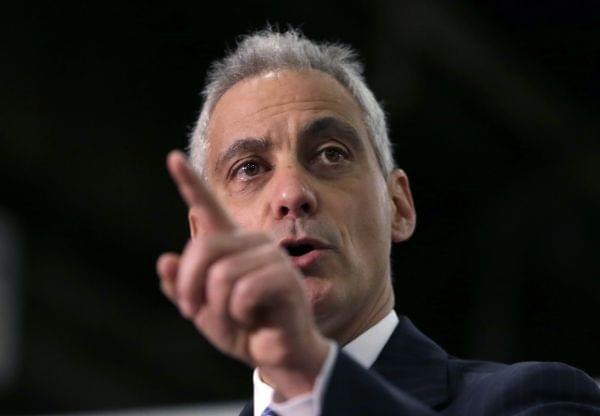Chicago Increases Minimum Wage; Mayor Hopes State Follows Suit

In this photo taken Monday, Nov. 24, 2014, Chicago Mayor Rahm Emanuel talks about his future plan for Chicago during a visit to a city maintenance facility in Chicago. Chicago is set to become the latest U.S. city to raise its minimum wage, as Emanuel fast-tracks a politically popular plan to reach $13 per hour (AP Photo/Charles Rex Arbogast, File)
Chicago Mayor Rahm Emanuel says he hopes the city council's approval of a $13 minimum wage for the city will "jolt'' state lawmakers into raising the issue statewide.
The Democrat spoke Tuesday after aldermen overwhelmingly approved raising the city's wage by 2019.
Emanuel says a higher Chicago rate and voters' strong support of a non-binding ballot measure in November should lay ground work for a higher Illinois rate.
State legislators are considering an increase to $11 by 2017 from the state's current $8.25. They're gathered in Springfield this week for a veto session.
Emanuel says he moved up the date of Tuesday's meeting over fears state lawmakers could block Chicago's attempt.
He says the city has to keep up with the cost of living and no working family should live in poverty.
The legislation includes several findings of a focus panel that examined the wage issue in Chicago earlier this year.
The bill states, "rising inflation has outpaced the growth in the minimum wage, leaving the true value of lllinois's current minimum wage of $8.25 per hour 32 percent below the 1968 level of $10.71 per hour (in 2013 dollars)."
It also says that nearly a third of Chicago's workers, or some 410,000 people, currently make $13 an hour or less.
The timing of the vote reflects a political reality, as Emanuel and other Chicago leaders are maneuvering ahead of the next election cycle.
"Chicago Mayor Rahm Emanuel wants to pre-empt state action on local minimum wages," Northern Public Radio reports, adding that among those who approve the pay hikes, "Officials are worried business groups will push for Springfield legislation that prohibits municipalities raising their minimum wage higher than the state's."
As NPR's Marilyn Geewax reported after the midterm elections, voters in Alaska, Arkansas, Nebraska and South Dakota approved binding referendums that raise their states' wage floor above the federal minimum.
Links
- Gov. Quinn: No Regional Minimum Wage
- Durbin, Callis, Ammons Campaign On Non-Binding Minimum Wage Referendum
- Quinn Campaigns For Raising Minimum Wage While On Low-Wage Challenge
- Quinn To Live On Minimum Wage Next Week
- Quinn Approves Minimum Wage Ballot Question
- Lawmakers OK Minimum Wage Ballot Measure
- Illinois House Passes Minimum Wage Ballot Measure
- House Panel Advances Illinois Minimum Wage Ballot Question
- Durbin, Quinn Push For Minimum Wage Increase
- Minimum Wage Hike Proposal Clears Senate Committee
- Gov. Quinn Wants To Double Earned Income Tax Credit, Increase Minimum Wage
- Raising the Minimum Wage
- Quinn Wants Higher Minimum Wage By Christmas 2014
- Quinn Keeps Pushing To Raise Minimum Wage

